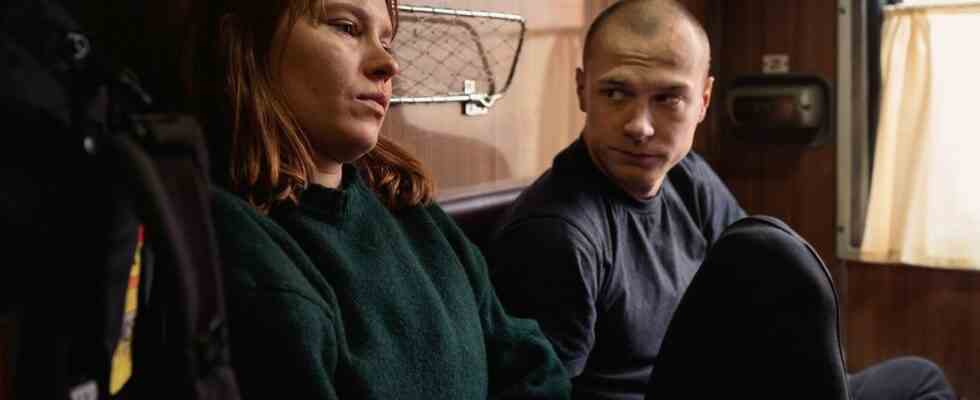A train journey lasting several days in a sleeping car compartment that you have to share with a complete stranger – not a pleasant idea for any woman. It gets even harder when the young fellow passenger has a shaved head and a bully build, unpacks cheap booze and long-life sausage and immediately makes the first lewd remark. To make matters worse, one cannot hide his origin at this point – he is Russian.
Doesn’t that sound like the film of the hour – the hour of the newly discovered Russian skepticism, yes possibly Russophobia in Western societies? Putin’s war of aggression is raging in Ukraine, young Russian men with shaved heads and thug builds are wreaking havoc there, and while they may have been lied to by their government and sent into slaughter without warning, good and bad seem to be very clearly divided here.
The war in Ukraine is also a war of images, a war of images of people that is reshaping our perception these days. Russians are read differently in reality and in fiction than they were six weeks ago. This leads to the question: How do filmmakers, how does the media avoid the danger of transporting Russian clichés? And if you want to avoid stereotypes, can a harmless, lovable character be read that way when there is hardly any room for this interpretation in society? Such considerations almost inevitably accompany current films in cinemas and on television.
However, the Finnish film “Abteil Nr. 6” by Juho Kuosmanen was finished long before the start of the war, and last summer it won the Grand Jury Prize in Cannes. Even the start date in Germany was set well before the Russians invaded, so the whole thing is a coincidence. A happy coincidence: Because now there is a special focus on how to deal with stereotypical Russian characters in the cinema, how to use clichés to undermine them – and how friendships between peoples might even arise.
Because the female protagonist of the film, her name is Laura (Seidi Haarla) and comes from Finland, is not a delicate plant either. When her obtrusive neighbor, who introduces himself as Ljoha (Yuriy Borisov), asks her how to say “I love you” in Finnish, she agrees to teach him the phrase. And then spells it out with relish, sound for sound: “Haista vittu – fuck you!”
The two travel by train from Moscow to wintry Murmansk. She wants to see petroglyphs there, thousands of years old stone drawings. He wants to steal money from a mine, as he calls it. “For my business,” he boasts, grabbing his cheap wristwatch in a cosmopolitan manner, as if he were wearing a Rolex. Laura wants to know what kind of business that is. “It doesn’t matter. Business is business,” he replies defiantly, rubbing his index finger and thumb together.
Cultural borders and class differences must be overcome
Otherwise, the old movie rule applies that this strange couple first does everything they can to take care of themselves not to get closer. Laura tries to find another compartment, at the first stop in Saint Petersburg she even hides from Ljoha in the train toilet. Later, she stands in a telephone booth at a train station and pretends to be talking to someone so as not to have to pay attention to the nuisance jumping up and down in front of the windows. But it’s just as clear that the two can’t escape the road movie script and are therefore stuck together in this compartment.
The whole thing is based on the novel of the same name by Rosa Liksom, which is set in the late Soviet era. Juho Kuosmanen shifts the plot in time, but not to the present, but to the 1990s. The two drive through a Soviet empire that has already dissolved, but cell phones and digitization do not yet exist. So Laura and Ljoha are cut off from the outside world and have to deal with the here and now.
In the process, Laura slowly regains her love of adventure, which was also at the origin of the journey. At a stop, she gets out briefly, wanders through dark alleys and comes back with home-made schnapps. Ljoha takes her on a nightly stopover, casually steals a car and drives her to an acquaintance in the middle of nowhere. The old woman tells how she managed to stay true to herself. Laura nods in a friendly but confused manner. After this trip, the two are friends. If you asked them why, they probably wouldn’t have an explanation.
In doing so, not only cultural borders but also class differences have to be overcome. “And if you have seen these petroglyphs – then what?” asks Ljoha. The fact that someone could travel to Murmansk simply for pleasure is inconceivable to him and yet arouses his interest. “You have to know the past to understand the present,” Laura parrots a sentence from her academic friends in Moscow. And doesn’t even seem to convince himself.
The simple desire to be noticed and taken seriously is in the room for both, but for that they first have to find out who or what they want to be. Kuosmanen concentrates on the vibrational changes between Laura and Ljoha that often take place between the lines, and he places great trust in his leading actors Seidi Haarla and Yuriy Borisov, who always find new surprises in their characters.
Borisov gives Ljoha a superficial physicality that lets his boyish nature shine through in awkward movements. A brief hesitation and the urbane gesture becomes a sleight of hand. Laura’s smile in the face of such insecurities turns to understanding over time. These short moments in which Laura and Ljoha manage to let go and trust their newly formed friendship are healing and exhilarating at the same time.

